How Julian Assange became a global wrecking ball
The unwelcome presence of Julian Assange in the Ecuadorean embassy didn’t stop him from disrupting the world. His link to Russia isn’t the only interesting dynamic with a superpower he has developed.
Behind the Scenes
Don't miss out on the headlines from Behind the Scenes. Followed categories will be added to My News.
When Julian Assange was dragged, yelling and dishevelled, out of the Ecuadorean Embassy in London by seven police officers and manhandled into a van, his undignified exit was broadcast live to air on YouTube.
A video news agency called Ruptly had set up camp across the road from the Ecuadorean Embassy on April 5, when WikiLeaks first started reporting that its founder, the 47-year-old Australian Assange, was in danger of being kicked out, and was live-streaming vision of the door of the embassy.
Ruptly is a German-based agency owned entirely by RT — the TV network formerly known as Russia Today.
Russia Today, in turn, is a wholly-owned entity of the Russian Government and was launched by Vladimir Putin more than a decade ago.
MORE ON ASSANGE:
WikiLeaks’ Assange legal war heats up
How Assange’s ‘diva demands’ shocked embassy staff
Analysis: How Assange made a fatal mistake
PM on Assange: 'There is no special treatment'
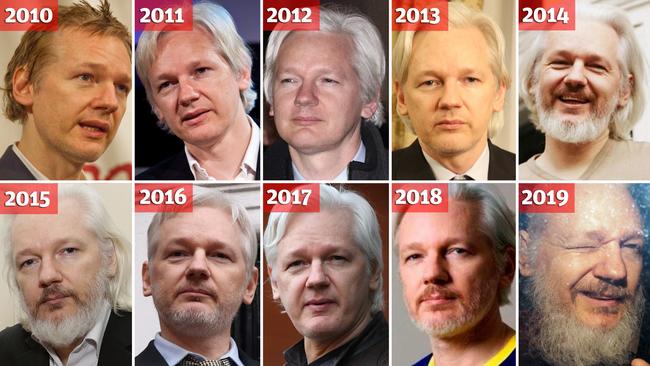
The one media outlet concerned enough about Assange to set up a live stream which broadcast for 139 hours was a media outlet wholly owned by the Russian Government.
They got a great scoop, capturing live images of Assange looking like a grubby Rip Van Winkle after his seven-year self-imposed confinement inside the embassy.
But Russia’s relationship with Assange isn’t the only interesting dynamic with a superpower that the fabled hacker has developed.
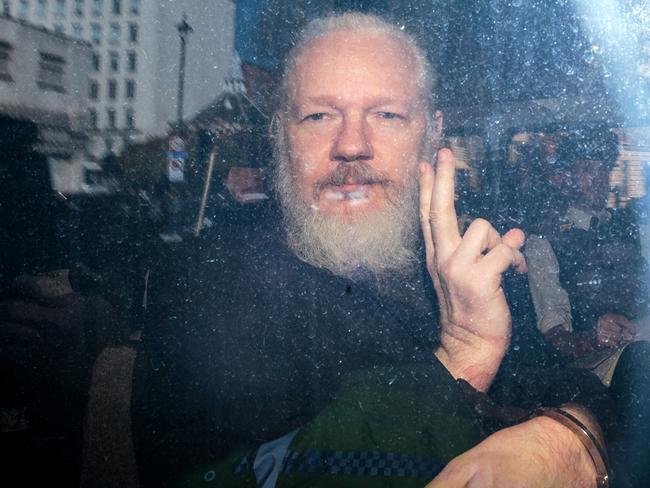
Back in 2010-2011, WikiLeaks, the whistleblowing website set up by the former Melbourne-based computer geek, published 750,000 classified documents stolen by former US Army Chelsea Manning, detailing US defence operations, alleged abuses at Guantánamo Bay and revealing that more Iraqi civilians had been killed in the war than officially reported.
Assange’s decision to hide in the Ecuadorean Embassy in London came as he was seeking to avoid extradition to the US to face charges relating to the documents — but more on that later.
The unwelcome presence of Assange in the embassy didn’t hold back his ability to disrupt the outside world, and during 2016, Wikileaks published troves of emails that Hillary Clinton would go on to partially blame for her election loss to Donald Trump.
The emails, including tens of thousands that had been erased from Clinton’s personal account, were allegedly hacked by Russian agents and then passed on to Wikileaks, according to an indictment issued last year by Special Counsel Robert Mueller in his probe into that country’s attempts to influence the US polls.
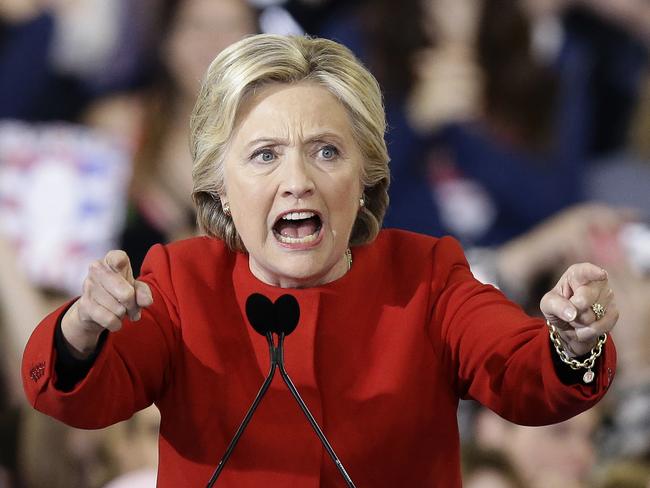
And one of those hacks came the same day the then-Republican candidate, had mockingly hectored Russia from a Florida stage to help unearth them.
“Russia, if you’re listening: I hope you’re able to find the 30,000 emails that are missing,” Trump said from behind a lectern with a US flag hanging nearby.
Given how long the “Russia hoax” or “witch hunt” has bedevilled Trump, he could conceivably regret the comment and a later one in which he said he “loved” Wikileaks.
Certainly yesterday, he was singing from a different playbook, telling reporters at the White House: “I know nothing about WikiLeaks. It’s not my thing and I know there is something having to do with Julian Assange. I’ve been seeing what’s happened with Assange”.
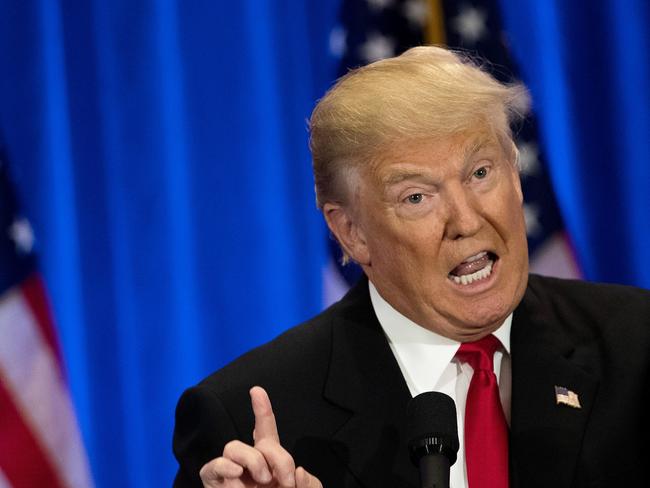
It became clear several hours after Assange’s arrest that the US would indeed seek to extradite him on charges relating to publishing the documents Manning had provided.
The US Justice Department released a seven page indictment alleging that over four months in 2010 Manning “downloaded four, nearly complete databases from departments and agencies of the United States” containing information about US army activities in Iraq, Afghanistan and Guantánamo Bay.
The leaks also contained embarrassingly blunt assessments by US diplomats about its overseas efforts and opinions about allies.
Assange then colluded with Manning, according to the indictment, to crack the passwords of secure servers and release information that “could be used to the injury of the United States and the advantage of a foreign nation”.
He faces a five-year prison term in the US for the hacking charge and could potentially face espionage charges like those that saw Ms Manning court-marshalled and imprisoned in 2013.
But any extradition could be years away, with Assange’s lawyers saying they will fight the move, which can only come after he serves any sentence handed down in Britain.
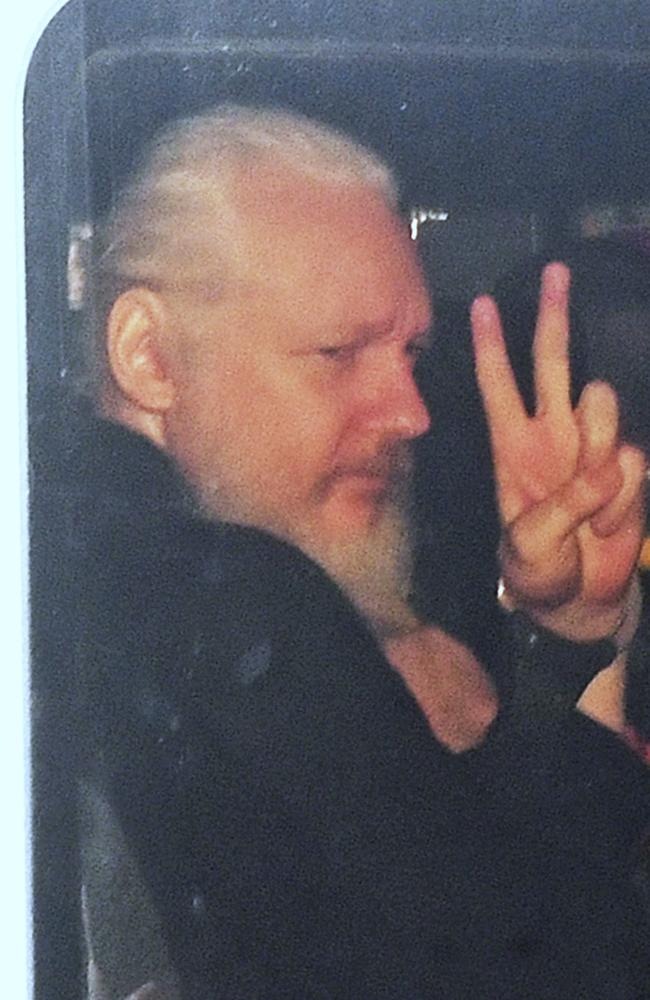
Perhaps appropriately, there was only one government that yesterday rushed to defend him.
British Prime Minister Theresa May told the House of Commons she was sure the “whole House will welcome the news this morning that the Metropolitan Police have arrested Julian Assange’’ and “this goes to show that in the United Kingdom no one is above the law.’’
Australia’s Foreign Minister Marise Payne went out of her way to avoid expressing any opinion at all.
But Russian Foreign Ministry spokeswoman Maria Zakharova condemned the arrest, writing: “The hand of ‘democracy’ squeezes the throat of freedom” on her Facebook page, according to the Moscow Times.
The Moscow Times also reported Alexei Chepa, deputy chairman of the State Duma International Affairs Committee, advocated for protecting Assange’s rights.
“We need to use all international opportunities to protect the person who tried to expose the truth and bring information to the public that some entities carefully concealed,” Chepa was quoted as saying.
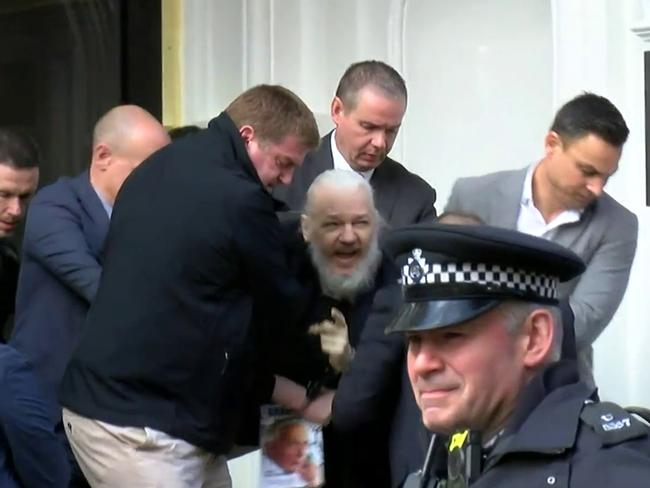
Assange began publishing the documents in instalments in 2010. During the same year, two women went to Swedish police and complained about Assange, sparking an inquiry into sexual assault allegations.
The allegations and inquiry were quite specific to Sweden and related to allegations he failed to or refused to wear a condom — with the main element of the inquiry relating to unprotected sex, rather than the entire sex act itself.
Assange was by then living in London, and had co-operated with preliminary inquiries from police, but he feared being extradited to Sweden would then allow the US to extradite him for prosecution over the documents.
He began a series of appeals, backed by high-profile supporters in London such as heiress Jemima Goldsmith, but on May 30, 2012, the Supreme Court ruled against him.
He disappeared into the Ecuadorean Embassy on June 12, and was granted full asylum by the Ecuadorean Government on August 16 that year.
However, efforts to transfer the Australian, whose birth name was Julian Hawkins, to Ecuador, were thwarted when the British vowed to arrest him the second he stepped foot outside the door.
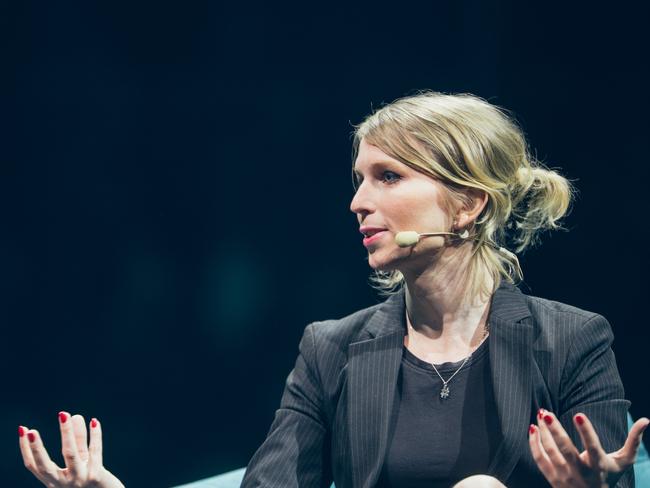
In the early months authorities had 24-hour surveillance on the embassy building, rented a flat across the road so intelligence agents could spy on Assange, and cooked up plans for arresting him if he tried to leave.
The embassy, in a handsome building next-door to the famed Harrod’s department store in Knightsbridge, had limited space, and Assange was confined to two rooms, very occasionally venturing out onto the first-floor Juliet balcony to speak to the media.
His cat, wearing a bow-tie, was often seen sunning itself in the window. Someone even ran a Twitter feed on behalf of the cat, with the Embassy Cat account, now defunct, attracting 31,000 followers.
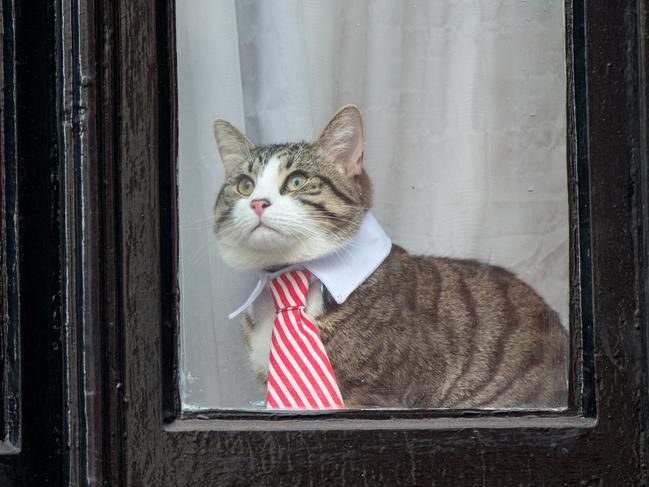
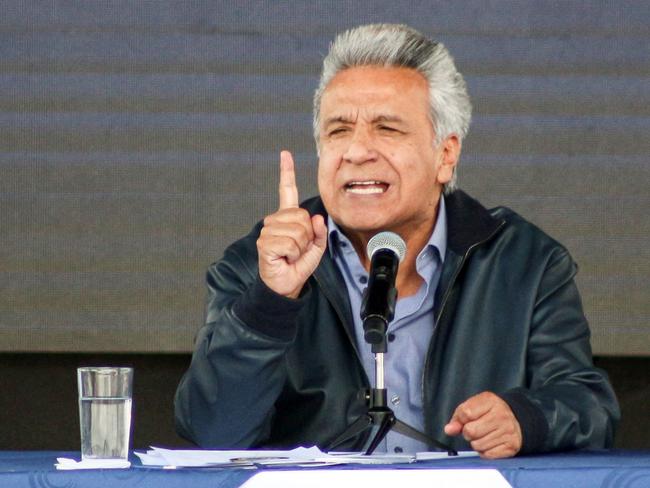
The British media have dubbed Julian Assange Marmite — because people either love him or hate him — and the Ecuadoreans, who loved him in those early days, eventually grew tired of their troublesome lodger.
Leftist Ecuadorean president Rafael Correa had granted him asylum but when new president Lenin Moreno won office in 2017, he described Assange as an “inherited problem”.
The relationship between Assange and the Ecuadorean government steadily deteriorated, with the embassy cutting off Assange’s internet and sending him a list of demands including banning him from interfering with other countries internal affairs, cleaning his bathroom and taking better care of his cat.
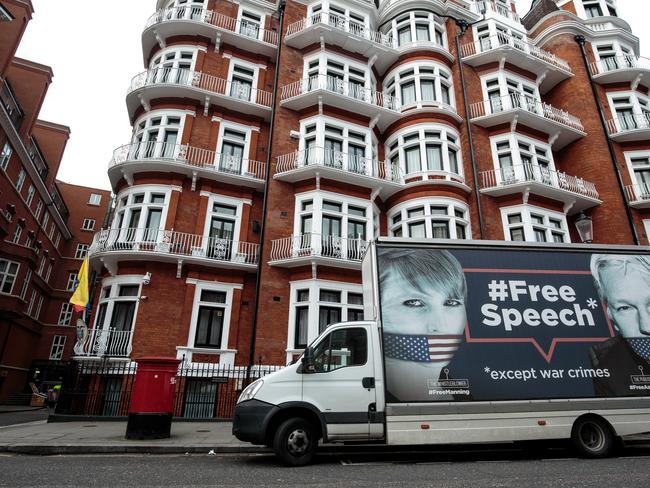
In recent days the relationship had fallen apart, and WikiLeaks accused the Ecuadorean government of spying on Assange, resulting in an effort being made to extort the Australian out of three million euros ($4.7 million), in a case busted by the Spanish police.
The case made the front page of the Times of London on Thursday morning, detailing allegations that Assange was spied on and sexually extorted, although it does not pin the blame on the government.
It’s not clear who else might have been able to obtain photographs from inside the embassy, if not the Ecuadoreans.
Either way, the embassy finally called the cops. Assange’s asylum was revoked, and on Thursday morning plain-clothed Metropolitan Police went in, dragging the haggard-looking Assange out and forcibly carrying him down the stairs and pushing him into a van.
Hours later, Assange was convicted in the Westminster Magistrates Court of breaching his 2012 bail.
His case was adjourned to the Crown Court, which can hand down maximum sentences for the charge of one year in jail, compared to the magistrate’s court maximum of three months.
The US was given until June 12 to produce any document they will rely on in their extradition request.


